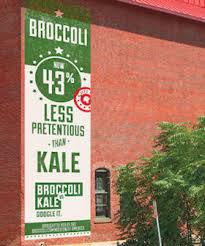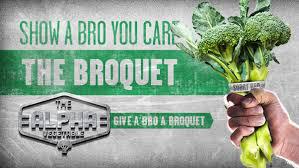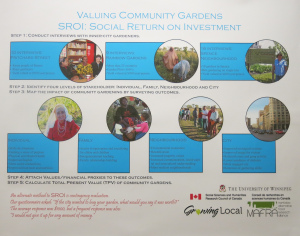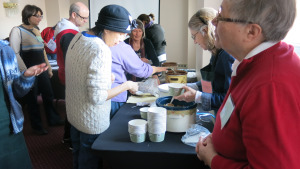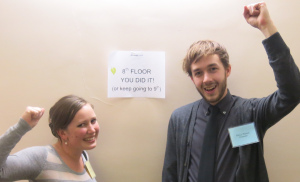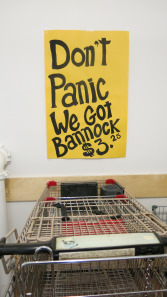 Two members of the team (Marla and Miranda) had the opportunity to go to Winnipeg to visit Food Matters Manitoba and attend their annual Growing Local Conference. We had a wonderful time in Winnipeg (despite the frigid temperatures).
Two members of the team (Marla and Miranda) had the opportunity to go to Winnipeg to visit Food Matters Manitoba and attend their annual Growing Local Conference. We had a wonderful time in Winnipeg (despite the frigid temperatures).
We were really struck by the similarities in our work, our approaches and values, as well as the similarly sized populations for Nova Scotia and Manitoba. There are also a few really big differences – namely the remote, northern context – that simply doesn’t exist here in Nova Scotia.
We wanted to share some of the exciting things were learned about in Manitoba, so without further ado:
Our Top Twelve List
In no particular order…
1) Food Hubs: Distribution is on the top of everyone’s mind in the food world these days. How do we get small and medium-scale farm products to various markets – restaurants, institutions, households? Food Hub models are popping up trying to answer this question. Food Matters Manitoba just finished a feasibility study on Food Hubs. One finding is that there is a spectrum of models that could work – starting small 1) Brokering: being a broker between farmers and markets, then moving up to 2) Distribution: brokering plus having a storage facility and physically distributing, one more step up is 3) Limited Purchase: purchasing some goods + storage + broker + distribute and a larger-scale model would be 3) Full Scale: purchasing all goods from farmers + storage + broker + transport of goods. For more info on Food Hubs check out the National Good Food Network’s resources.
2) Digital Storytelling: At the preconference event we had the opportunity to view three digital stories told by First Nations youth. Using photos, music, and voice-over, the youth reflected on the health of their communities, traditional knowledge and their food choices. The results were really powerful. Sustain Ontario has also done a digital storytelling project on personal and collective efforts to transform the food system. Check out the Scottish Health Council for tips on doing Digital Stories.
3) Michael Moss: Pulitzer Prize winning journalist, Michael Moss presented at both a preconference public lecture and at the conference itself. He’s the author of Salt, Sugar, Fat: How the Food Giants Hooked Us. After that talk, I’ll never be able to look at a bowl of Doritoes the same way again. Check out this video. He discussed how the 1 trillion dollar food industry has used salt, sugar and fat to make us crave their foods and to cover up unpalatable ingredients. He also explored whether the powers of marketing could be used to convince people to buy more fruit and vegetables. In the style of the classic Coke Vs Pepsi competition of the 1980s (which raised market share for both companies), he launched a Kale vs Broccoli campaign, with the tagline “Broccoli: Now 43% less pretentious than kale.”
4) Social Enterprise Models: We’re no strangers to social enterprise in Nova Scotia, but we loved getting a peek inside a few different food related social enterprises in Winnipeg. There are two cafes that used locally produced foods and employ either at-risk youth or people with disabilities. And there is a soup business, called Soup Bee, that uses local ingredients, provides training (and then references) for people from at-risk populations, and delivers the soup via bicycle courier to offices in downtown Winnipeg. Big lesson from all groups: While revenues will offset some of your costs, you’ll likely still need grants or fundraisers to make up the rest of your expenses.
5) Regulations shutting down local. How do we support small scale?: One session was a workshop garnering voices and adding to an action plan to support small-scale producers. This video highlights a farm raid that occurred in Manitoba that calls attention to the need for scale appropriate regulations for small scale farmers and processors to support the development of a sustainable local food system. Over the past decade or more, federal regulations on food safety have made it increasingly harder for smaller scale abattoirs and processing facilities to stay open with stipulations such as needing a paved parking lot or male and female bathrooms (Andree, Cobb, Moussa & Norgang. (2011). Building Unlikely Alliances Around Food Sovereignty in Canada). In the states there is a trend called the Cottage Food Act to support smaller scale businesses. For an interesting story on bread in California check out this video. To keep up to date with Manitoba’s process check out RealManitobaFoodFight.
6) Social Return on Investment (SROI): A trend picking up in the social sector – how do we measure community development in money? There was a poster presentation at the conference that I found interesting. First you name the outcomes or benefits of having a community garden. For example: making friends, learning how to garden, eating more vegetables. Then you attach monetary values to these outcomes based on a measurable proxy. Some examples from poster project: making friends (self-confidence course $2000), garden skills (horticulture course $2000), eating more vegetables (spending on snacks $500). Check out more resources from CCEDNet.
7) How to Communicate Food Systems work: The ever-tricky – how to communicate complex systems change work to the general public? Or use language to understand it ourselves for that matter! Food Matters Manitoba has had many communications interns over the years working on this and found that the Sustainable Food Centre out of Austin Texas has done a good job. Check out Food Matters Manitoba‘s new and shiny website.
8) New Food Skills (Crock Pot Cooking, Herbs, and more): Even though we’ve taught lots of cooking and other food skills workshops over the years, it’s always fun to learn something new. We went to a delicious workshop on crock pots. (Tip: When adapting a standard recipe to a slow cooker, reduce the liquid by 50%).
I tasted some new flavours in an herbal workshop and was inspired to use more herbs in my day-to-day cooking (nettle! tumeric! cayenne! licorice!). We learned about how dehydrators can save the day when you’ve run out of freezer space and just can’t can any more! One thing to note is that the dryer climate in Winnipeg makes keeping dehydrated goods easier than in the more humid Nova Scotia.
9) Urban Garden Trap Lines: One very lively presentation was given by the Powershouse Producers. A group of women stewarding underused food sources around the city. They have a map of their ‘urban garden trap line’ – a route through the city where they harvest foods, many of which are plants or trees not used by property owners. These fiesty ladies go around knocking on doors to ask if they can be the caretaker of the plants and use the food for those going hungry in the community. They trade goods and skills to augment where needed. Winnipeg also has a very active organization called fruitshare coordinating harvesting fruit and sharing it 1/3 with landowner, 1/3 with pickers, 1/3 with food banks.
10) Passing on traditional food skills to youth: The preconference session focused on First Nations youth and the passing on of traditional skills. We heard about hunting and trapping workshops, saw a video of a young men raising his own chickens, saw photos of caribou cooking workshops. This is more than just about skills – it’s about confidence, community and passing on traditions to the next generation.
11) New Funding models: A lot of funders are rethinking their funding programs these days. This session was entitled “Shared Learning and Reciprocity in Philanthropy” and focused on the “Northern Manitoba Food, Culture and Community Fund”. There are currently 8 funders, working with 5 advisors to pool resources, share knowledge and support projects in the north. Because of the harsh climate and remoteness of the communities, there is a high level of “risk” in terms of project success and often a lack of cultural understanding on the part of funders. This model aims to break down barriers and share lessons learned across projects.
12) Friendly Manitoba: Oh Manitoba, you made us laugh! The Growing Local Conference was held at the historic Marlborough hotel, and as the Executive Director of Food Matters Manitoba noted in her opening address, “The hotel is so historic that only 2 of the 4 elevators are working.” So, they posted motivational posters in the stair well to cheer on our 8 story climb.
But not just the posters were cheery, the Food Matter Manitoba staff gave us a food tour of Winnipeg, answered our many questions, and were just lovely to spend time with. Those license plates say “Friendly Manitoba” for a reason. Thanks guys! We had a blast!
Yours in Food,
Marla and Miranda

